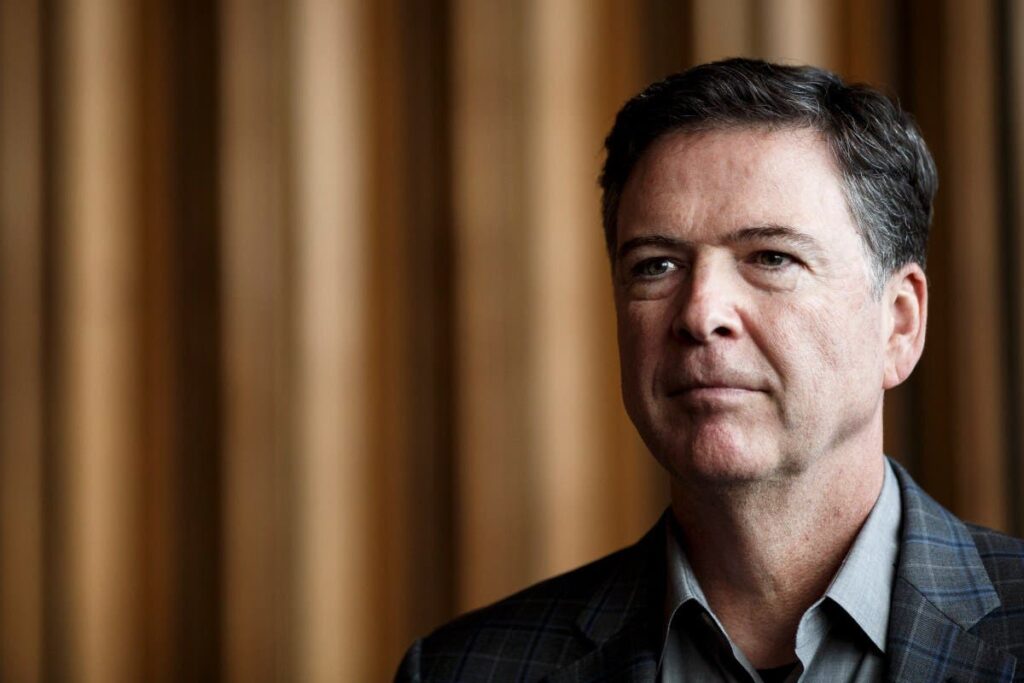A federal judge in Virginia has denied a Justice Department request for extended discovery deadlines in the criminal case against former FBI Director James Comey, ordering prosecutors to provide all discovery materials to the defense by 5 p.m. today, October 13.
Comey, who led the FBI from 2013 to 2017, was indicted on September 25 in the Eastern District of Virginia on two felony counts: making false statements to Congress and obstruction of a congressional proceeding.
Newsweek reached out to the Department of Justice for comment via email outside of normal office hours on Monday.
Why It Matters
The case against Comey carries implications far beyond the courtroom. By accusing a one-time head of the nation’s top law enforcement agency of lying to Congress and obstructing a legislative inquiry, prosecutors have placed questions of truthfulness, accountability, and political motive at the center of a rare criminal proceeding.
The outcome could redefine how far the Justice Department may go in pursuing high-ranking officials for statements made in oversight settings, testing public confidence in whether such prosecutions serve justice or politics.
The Case
Comey has been accused of lying to Congress and obstructing a Senate investigation. After weeks of disagreement over evidence-sharing, U.S. District Judge Michael S. Nachmanoff ordered prosecutors to turn over all discovery by October 13, emphasizing fairness and the need to keep the high-profile case on schedule for its January 2026 trial.
The indictment alleges that Comey falsely told a U.S. senator during a 2020 Senate Judiciary Committee hearing that he had not authorized anyone at the FBI to act as an anonymous source in news reports concerning an individual identified as “Person 1.”
Prosecutors contend that Comey knew the statement was untrue and that he had, in fact, authorized another individual, identified in court filings as “Person 3,” to serve as a confidential source.
The second count accuses Comey of “corruptly endeavoring to influence, obstruct and impede” a congressional investigation by making false and misleading statements before the committee.
Comey has pleaded not guilty.
New Developments
On October 8, Nachmanoff scheduled a jury trial for January 5, 2026, and issued a pretrial briefing schedule.
The first round of motions is due on October 20, 2025, and the second round is due on October 30. Hearings are set for November 19 and December 9.
Soon after the schedule was set, prosecutors and the defense clashed over the terms and timing of discovery.
The Justice Department filed a motion on October 11 seeking two separate discovery deadlines: one on October 14 for matters related to motions challenging the appointment of the U.S. Attorney and alleging vindictive or selective prosecution, and a second on October 20 for all other materials.
Assistant U.S. Attorneys N. Tyler Lemons and Gabriel J. Díaz wrote that “good-faith discussions were attempted by the parties, [but] the parties were unable to agree on a joint discovery order.” They argued that “two discovery deadlines are appropriate in this case” because of the distinct nature of the motions the defense intended to file.
Comey’s counsel, Jessica N. Carmichael and Patrick J. Fitzgerald, opposed the request and submitted a proposed standard discovery order tying the government’s disclosure deadline to the first pre-trial motion date, October 20.
They argued that the government should produce materials promptly under Federal Rule of Criminal Procedure 16(a).
Nachmanoff sided with the defense.
In an order issued October 12, he denied the government’s motion and directed prosecutors to provide all discovery by October 13.
“Under no circumstance shall the failure to reach agreement with respect to a protective order justify withholding prompt disclosure of discovery to defense counsel for review,” the judge wrote.
The court’s order also set a firm timeline for resolving any disputes over protective measures. If the parties could not agree on the terms of a protective order by 5 p.m. on October 13, the court stated it would “promptly set a hearing to resolve any such dispute.”
Keeping the Case on Track
The dispute over discovery follows the government’s earlier assertion that it had provided Comey’s team with appointment documents for the U.S. Attorney and that disagreements persisted regarding the handling of classified or sensitive material.
Prosecutors had argued that “considering the sensitivities and exposure associated with this prosecution, a discovery protective agreement is a vital part of the overall discovery plan.”
The court’s denial of the government’s motion represents an early setback for prosecutors in a high-profile case involving a former senior law enforcement official.
The ruling ensures that Comey’s defense team will receive the government’s evidence ahead of the initial motion deadlines and underscores the judge’s emphasis on timely disclosure.
What People Are Saying
President Donald Trump told reporters after Comey’s indictment: “It’s about justice. He lied, he lied a lot…It’s about justice, not revenge.”
Former FBI Director James Comey, in a video statement following his indictment: “I have great confidence in the federal judicial system and I am innocent, so let’s have a trial, and keep the faith,” adding that “Somebody that I love dearly recently said that fear is the tool of a tyrant…But I am not afraid.”
What Happens Next
The Justice Department must comply with Nachmanoff’s order to deliver all discovery materials to Comey’s defense team by 5 p.m. on October 13, and both sides must finalize or litigate a protective order governing sensitive evidence.
The first round of pretrial motions—likely including challenges to the indictment and the U.S. Attorney’s authority—is due October 20, with a second round due October 30 and hearings set for November 19 and December 9.
Unless delayed by new motions or disputes, the case is set for jury trial on January 5, 2026, in the Eastern District of Virginia, where a judge and jury will decide whether the former FBI director knowingly misled Congress or is being targeted in a politically charged prosecution.
Read the full article here

